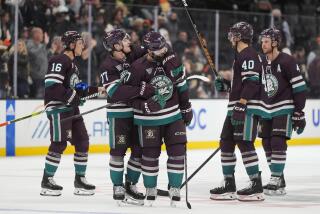Mighty Ducks â95-â96 : Sillinger Ready to Answer When Opportunity Knocks : Hockey: Tired of being labeled a prospect, former Red Wing wants to prove he can be a regular in the NHL.
ANAHEIM â Perhaps Mighty Duck Coach Ron Wilson was generous last season when he said newly acquired center Mike Sillinger was a potential 75- to 80-point producer in the National Hockey League.
Among the skeptics: Sillinger himself.
Yeah, right, Sillinger thought, he has heard this before.
He had heard it from the three Detroit Red Wings coaches he played for--Jacques Demers, Bryan Murray and Scotty Bowman.
He had heard from former Kings Coach Barry Melrose, who coached him on the Adirondack Red Wings of the American Hockey League in 1992.
The scouting report was always the same: plenty of potential, but where was the productivity?
âYou hear that about a lot of guys in this league,â Sillinger said, shaking his head.
âYou hear it over and over. But it all comes down to opportunity. There are a lot of guys, if given the chance, can give you 75 to 80 points.â
After toiling in anonymity for almost five seasons in the Red Wing organization, Sillinger has that opportunity last spring, when he was traded to the Ducks.
Only 24, heâs getting the playing time he has yearned for--but never got--since he was drafted 11th overall by the Red Wings in 1989.
The Ducks are hoping his speed and play-making skills will improve a pathetic power play that produced only 23 goals last season--seven more than Bostonâs Cam Neely had by himself.
âI hope I fit in,â Sillinger said. âBut I donât think the Ducks would have traded for me if I didnât.â
He didnât in Detroit, where he spent 4 1/2 seasons, bouncing between Adirondack and Detroit.
He led Melroseâs 1992 Adirondack team in playoff scoring (28 points in 15 games), but was called up to the parent club after the first round of the playoffs. Adirondack went on to win the Calder Cup without him.
In Detroit, Sillinger was nothing more than a late defensive replacement, stuck behind Sergei Fedorov, Steve Yzerman, Keith Primeau and Kris Draper.
While its no shame to be fifth on that talented depth chart, Sillinger likened his role to backing up Baltimore Oriolesâ shortstop Cal Ripken Jr.--when will you ever get a chance to start?
âI went through three different coaching staffs while I was there,â Sillinger said. âI kept having to prove myself, over and over, every year.â
His best season was 1993-94, when he scored 29 points, including eight goals, in 62 games. Not exactly Gretzky-type numbers.
By the middle of last season, he was banished to the bench. He didnât play in his final 15 games in Detroit, eventually watching games in his dress clothes from the press box.
âI was playing off and on for a couple seasons and then, Boom! I was out of the lineup,â Sillinger said. âI was behind the eight-ball, and I had to make a stand for myself.â
Sillinger begged to be traded, and the Red Wings finally obliged.
Preparing for a run at the Stanley Cup, the Red Wings dealt Sillinger and defenseman Jason York to the Ducks in April. In return, the Ducks gave up on everybodyâs favorite thug--left wing Stu Grimson--defenseman Mark Ferner and a 1996 sixth-round draft pick.
âDetroit needed some toughness for a run at the Cup,â Wilson said. âThey had to give up two young talented guys to get it, two guys who can really help us. Itâs a trade Detroit may live to regret.â
The Red Wings will regret it if Sillinger sets up right wing Valeri Karpov and left wing Denny Lambert. They will regret it if York develops into the solid defenseman Wilson thinks he can be.
York and Sillinger flashed some potential last spring, although Sillinger admits he didnât put up the numbers he wanted. He scored in seven of 15 games, and York adding four assists in his first eight games. The Ducks went 6-8-1 with them in the lineup.
Sillinger had some problems adjusting to a regular shift after spending a month sitting on the sidelines. He hit the post on a couple shots, and missed a couple of open nets.
âMike made a pretty smooth transition here,â Wilson said. âHe just had some bad luck around the net. I think he was pressing a little bit. He had just left Detroit, and he wanted to show the league that the Red Wings had given up on him too early.â
Thatâs exactly Sillingerâs intent.
âYou always want to show them up and prove them wrong,â he said. âIf you donât have that kind of attitude, you shouldnât be in this league in the first place.â
Still, it was a little hard for Sillinger to watch the playoffs last season. Detroit made it to the Stanley Cup finals--without him.
âThe last three years Detroit was supposed to go to the Stanley Cup finals,â Sillinger said. âThe year I leave, then they make it. But thatâs a small sacrifice for me to make to further my career.â
(BEGIN TEXT OF INFOBOX / INFOGRAPHIC)
The File on Sillinger
Born: June 29, 1971, in Regina, Saskatchewan. Height: 5-10. Weight: 190. Shoots: right. Drafted: Detroit in first round (11th overall) in 1989.
CAREER RECORD
*--*
Yr. Team Lg Gm G A Pts 87-88 Regina WHL 67 18 25 43 88-89 Regina WHL 72 53 78 131 89-90 Regina WHL 70 57 72 129 90-91 Regina WHL 57 50 66 116 90-91 Detroit NHL 3 0 1 1 91-92 Adirondack AHL 64 25 41 66 92-93 Detroit WHL 51 4 17 21 92-93 Adirondack AHL 15 10 20 30 93-94 Detroit NHL 62 8 21 29 94-95 Detroit NHL 13 2 6 8 94-95 Mighty Ducks NHL 13 2 5 7
*--*
Career notes
Named to WHL All-Star second team in 1989-90, first team in 1990-91.
Led AHL with 19 assists and 28 points in 1991-92 playoffs.
Played in eight playoffs games for Detroit in 1991-92, scoring two goals and two assists.
Had 27 points in 13 games for Wien of the Austrian League during NHL lockout.
Traded with defenseman Jason York to Mighty Ducks in April, 1995, for Stu Grimson, Mark Ferner and a sixth-round draft pick in 1996.
More to Read
Go beyond the scoreboard
Get the latest on L.A.'s teams in the daily Sports Report newsletter.
You may occasionally receive promotional content from the Los Angeles Times.






